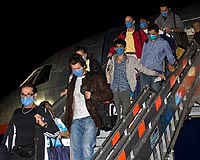| . |  |
. |
Johannesburg (AFP) June 9, 2009 South Africa's AIDS epidemic, the worst in the world, appears to be stabilising with infections among children and teenagers declining, according to a new national study released Tuesday. The overall situation remains grim, with 10.6 percent of the population, 5.2 million people, infected with HIV -- a figure that has hardly budged since the first survey by the Human Sciences Research Council was conducted in 2002. But the think-tank's study of 23,369 people found large drops in infection rates among children and teenagers, with youth saying they are much more likely to use condoms than in past studies. "There are promising findings of a changing pattern of HIV infection among children and youth," said Olive Shisana, head of the council and one of the lead investigators in the study. "The good news is that the change in HIV prevalence in children is most likely attributable to the successful implementation of several HIV-prevention interventions," Shisana said. HIV prevalence among children aged two to 14 is down from 5.6 percent in 2002 to 2.5 percent last year, the study said. The rate among youth aged 15 to 24 dropped from a high of 10.3 percent in 2005 to 8.7 percent last year, with the decreases most marked among teenagers, the report said. The declines coincided with increases in condom use among youth, with 87 percent of young men and 73 percent of young women saying they used a condom during their last sexual encounter. Ninety percent of youth said they had received at least some communication about the disease from the government. The report highlighted South Africa's extreme regional variations in the disease, with HIV prevalence at 15.8 percent in the eastern KwaZulu-Natal province, compared to 3.8 percent in the Western Cape, home to Cape Town. It also noted that prevalence among adults has increased, possibly due to the government's roll-out of anti-retroviral drugs which help people live longer. The biggest jump was in KwaZulu-Natal, where prevalence was up by 10.1 percent from 2002. "Although the overall situation remains dire, some solid progress has been achieved in the fight against the disease over the past few years, especially among teenagers and children," the study said. "There is therefore a need for the country to re-double its efforts in the fight against HIV if it is to turn the tide among the other age groups," it added. Share This Article With Planet Earth
Related Links Epidemics on Earth - Bird Flu, HIV/AIDS, Ebola
 Mexico to host swine flu summit in Cancun
Mexico to host swine flu summit in CancunMexico City (AFP) June 8, 2009 Mexico will next month host an international summit on swine flu at the Caribbean beach resort of Cancun, the country's health minister said Monday. Representatives from 40 countries and the directors general of the World Health Organization (WHO) and the Pan American Health Organization will take part in the summit from July 1 to 3, Jose Angel Cordova said in a statement. Less than two ... read more |
|
| The content herein, unless otherwise known to be public domain, are Copyright 1995-2009 - SpaceDaily. AFP and UPI Wire Stories are copyright Agence France-Presse and United Press International. ESA Portal Reports are copyright European Space Agency. All NASA sourced material is public domain. Additional copyrights may apply in whole or part to other bona fide parties. Advertising does not imply endorsement,agreement or approval of any opinions, statements or information provided by SpaceDaily on any Web page published or hosted by SpaceDaily. Privacy Statement |